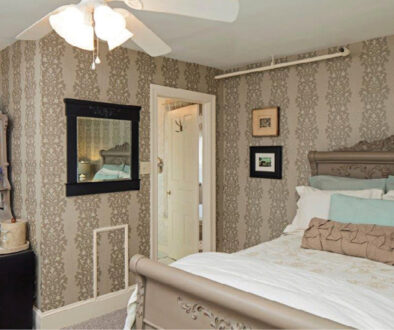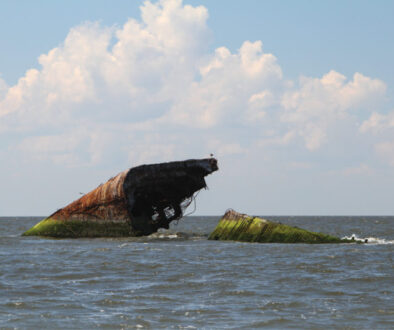Fifty Years of Family

Memorial Day weekend, 1966: a new contemporary kid on Beach Avenue threw open the doors for beach lovers in what was still sleepy old Cape May.
“Welcome to the exciting world of the MONTREAL RESORT MOTEL,” exclaimed the advertising. “We are waiting to serve you in any way to make your vacation a wonderful success. Remember, we offer the most modern conveniences and accommodations in the colonial atmosphere of Old Cape May. Facing the Ocean—Enjoy Your Stay in Cool Cape May. Heated swimming pool. Television. In-Room Music. Free Ice. Free Parking. Daily Maid Service. Pool Patio.”
The three-story Montreal with 27 rooms—featuring oceanfront sliding glass doors and balconies—was sturdy, built of steel, brick and concrete, to resist hurricanes and nor’easters. Its sky blue umbrellas and sparkling pool stood out stark modern against a town of mostly much older, fussier structures from the horse-drawn carriage eras of one and two centuries ago. The Montreal mirrored the new automobile-friendly motels popping up in Wildwood; in fact, the Montreal was designed by the very architect who used the same template for several Wildwood motels.
That Memorial Day 50 years ago culminated a dream come true for owners Harry and Sophie Hirsch, immigrant chicken farmers, poultry and produce suppliers from Corbin City, 30 miles north of Cape May. Son Larry says they had labored day and night overseeing construction of their new motel, named the Montreal with high hopes of enticing ocean-going Canadians south to the narrow fine white sand beaches of Cape May. It was a major financial commitment. They paid $12,200 for the beachfront lot at Beach and Madison Avenues and built the Montreal for $170,000.
At the time, winds of change were shaking Cape May from its dotage and decline as the first and most popular summer resort in Victorian times. Still under way were the vigorous clean-up and fix-up projects following the destructive Ash Wednesday Nor’easter of 1962 that pummeled property for three days, tearing up Convention Hall and damaging the boardwalk, homes and businesses. High expectations for a major boost in future tourism were generated by the opening of the Garden State Parkway along the length of New Jersey in 1964, making the cape more accessible from the north. The Cape May-Lewes Ferry crossing Delaware Bay also debuted in 1964, making possible vehicular traffic to and from neighboring Delaware and all points south.

It was a good time to be the new kid on Beach Avenue and poised for success.
What most locals did not know is that soon after the ’62 Nor’easter, Harry Hirsch’s friend Sid Hess approached him with a proposition. He said that a bar on the beach (now the location of Carney’s) was for sale and would Harry put up money and be a partner? Harry would be the backer, Sid would run the business. Harry agreed, but did not tell Sophie until settlement day. Though wary, she did not stop the purchase. Sid’s opened in 1963 and became a popular watering hole, with the Hirsches as part owners for a decade; it continued operating successfully for years after the Hirsches’ involvement ended.
Meanwhile, business at the Montreal was booming. Harry and Sophie bought a corner lot and added 15 more rooms. “Again, timing was their friend,” says son Larry. Radio preacher Carl McIntire bought Congress Hall in 1967, and to make a show of alcohol abstinence for his flock he moved the hotel’s bar onto the lawn and put the liquor license up for sale. Harry and Sophie were swift to purchase it, and swiftly utilized it to its full potential by opening the Montreal Restaurant and Cocktail Lounge in 1971.
Another dream of theirs come true: home-style cooking served on white linen tablecloths, as advertised.
“Dignified Dining is the hallmark of our splendid Restaurant and Dining Room. Sumptuous menu selections with sizzling steaks and succulent lobster treats the Specialties of the House; complimented [sic]with in-season salads plucked from nearby Garden State fields. And from the sea around us, freshly caught fish, crabs and clams. At our intimate Bar and Cocktail Lounge, tangy drinks are created by congenial mixologists. Lively entertainment is a nightly happening at the Montreal Inn.”
It seemed, Larry recalls, that the resilient, resourceful Sophie made everything work. Then in 1974, at the age of 48, she was stricken with cancer. Her sons were in Baltimore—Joe in boarding school, Larry just graduated in clinical psychology from the University of Maryland. A fourth floor was under construction at the Montreal, bringing the total number of rooms to 73.
It was the worst of times. Sophie passed away in August 1975. The Hirsch men, survivors that they are, made the best of a tragedy and decided to continue investing their energies and resources in the family business, a proper testament, they felt, to Sophie’s vision and hard work. Larry says it was not the path he had chosen, but he had no other choice than to put his future in the Montreal with his father and brother.
Half a century later, Memorial Day 2016, the success of the Montreal is legendary. The Hirsch family, now four generations strong and proud of continued ownership, launched a year-long celebration of the Montreal Beach Resort’s 50th anniversary, sharing its good fortune with newcomers and the many families who have become perennial vacationers.
Brothers Larry and Joe, and Larry’s son Jonathan, combined their creative energies into reimagining the boxy, 50-year-old space into a more open, comfortable, beautiful vacation destination with a 2016 vibe, but not losing what Larry calls “the most important element of Harry and Sophie’s legacy: our family always treating guests like family.” In the redesign, greater emphasis was placed on its best assets: panoramic ocean views, plus beach cabanas just a short walk away with food and drink services and indoor/outdoor bars, dining, lounging—no matter the weather—all packaged and freshly color coordinated in a rebranding with the name The Montreal Beach Resort. An emotional, important part of the golden year is honoring founders Harry and Sophie Hirsch. Theirs is a story of struggle, survival and success.
Harry was born in 1923, with the name Hersik Heiskowier, in the tiny remote village of Kucow, Poland, 150 miles south of the capital city Warsaw. Hersik was 14 in 1939 when Adolf Hitler’s German Army stormed Poland, claiming victory in a month and starting a campaign of rounding up Jewish people, seizing their property and herding them in ghettos awaiting trips to concentration camps and extermination.
Nazi soldiers pillaged farms in and around Hersik’s village. Realizing he was a potential target, Hersik fled to his sister’s home in the city of Lodz where he was less obviously Jewish. He worked there as a carpenter for two years until one morning at dawn, his daily fear became reality when Nazi soldiers rolled into the neighborhood. Hersik was forced into a crowded truck, worried for his life. He was transported to the Lodz Jewish ghetto where, a few days later, he happily—and luckily—found his older brother Josef. They existed in the ghetto, laboring under Nazi control, until SS officers arrived one day and loaded the brothers into a box car stuffed with humanity. They traveled in filthy, stifling conditions for two days, their destination Auschwitz, the concentration camp where tens of thousands of Jewish men, women, and children were killed in gas chambers and burned in crematoriums.
Hersik, by now 21, and his brother Josef both evaded death during eight months of imprisonment at Auschwitz. Their youth and stamina were a saving grace. In January 1945, Warsaw and Krakow fell to advancing Russian troops. The Nazis blew up crematoriums, shot prisoners and released thousands on a death march for hundreds of miles in wintry weather. Many died along the way, while others broke into smaller groups, still under the surveillance of German soldiers, who at times resorted to firing squads, killing innocents at random. The brothers, miraculously still traveling together, again defeated death and returned to Kucow, their village, to find no trace of their family. It was then that they decided to follow the footsteps of their uncle, who before the war had made a new life in America.
New life plans for Hersik inspired hope, romance and happiness. He met Sofia Gross in 1947 in a line at a displaced person’s camp. During the war she had participated in Poland’s resistance movement where her resilience and resourcefulness were tested and became a personal trademark of hers throughout her life. They married in May of 1947, but it was not until 1951 that they were able to gather the finances and clearances to sail to Philadelphia and where they became Harry and Sophie Hirsch.
The second and third generation Hirsches have traveled to Poland to trace their family’s story.
Joe joined his father for a trip to the home village Kucow in the 1970s when the country was still under Soviet Union communist rule. “The family house was still there,” says Joe. “There were people living in it. They took possession after the war, but didn’t own it, and were upset we had come to reclaim ownership. My father assured them, ‘No, no. No worries—we are just visiting.’”
And they visited Auschwitz, the death camp, where Harry—through wit, work and luck—had survived. “That was very difficult for my father,” says Joe, “to retrace steps, to see the big picture of what happened there when he was very confined to specific spaces during the war. To understand the scope of the death there, to see the railroad tracks where the boxcars filled with Jewish prisoners came in, the high barbed wire, the gas chambers, the smokestacks still standing. Harry’s breath became short at intervals. He almost fainted. That evening he had a major and frightening nightmare. And I had a better understanding of the man he was.”
Larry Hirsch and his family journeyed to Poland in 2008. By then the village of Kucow was no longer intact. They, too, visited Auschwitz. Son Jonathan says it was an emotional, humbling experience. “I was aware of the history of the Holocaust and that Pop-pop was at Auschwitz, but to be there and understand that your grandfather survived in one of these buildings of mass death—no matter how hard the day, no matter the depth of the problem I am having—the feeling of that place resonates with me all of the time. I think ‘my grandfather handled that—I can handle this, no problem.’”
“Our father had never dwelled on the past. He never expanded on stories about his wartime experiences,” says Larry Hirsch. That was until 2009, when Larry’s son Evan, a television news producer, asked his grandfather to participate in a CBS 3, Philadelphia, documentary featuring Holocaust survivors. The camera light came on and Harry Hirsch, in fragile health, talked for two hours straight, telling in detail his experiences during Hitler’s reign of terror. “He was like a faucet that could not be turned off,” says Larry. Afterwards Harry said he did not want to talk of the war again, not ever. The family honored his demand. But they are grateful for the recorded history of their beloved patriarch, and to have those stories also preserved between covers of their recently published book, A Cape May Story by Diane Stopyra.
That same year of 2009, third generation Jonathan Hirsch returned home to the family business, having graduated from Boston University with a degree in hospitality management and working at establishments in New England and Atlantic City. He took over management of the restaurant, generating new ideas with his father and Uncle Joe about how to reinvigorate the food and beverage business. Among the decisions was to pay tribute to the patriarch, renaming the restaurant Harry’s, with his face on the logo. They were skeptical about Harry’s reaction. “He was, after all, a humble man,” says Joe. But Harry didn’t fuss, wore a t-shirt bearing his name and face, and enjoyed a big party in his honor in 2010 when the restaurant and hotel reopened after extensive renovations. Harry passed away the next year, on August 20, 2011. He was 88 years old. He was remembered for being an unforgettable character who always drove pick-up trucks he named Betsy, and acknowledged as one of largest owners of Cape May properties on the Washington Street Mall and beach front.
As plans emerged for the 50th anniversary this year, the bar and restaurant became an even more integral part of the Montreal. Harry’s Ocean Bar & Grille is now sporting a new look, a new attitude, and new healthy additions to the menu. The Hirsches contracted with one of the East Coast’s top hospitality firms, DAS Architects of Philadelphia, to redesign the spaces. Coincidentally, principals of the firm, David Schultz and his wife Susan Davidson, live part time in Cape May where they fell in love with each other, and the town, years ago when sailing David’s J-27 from the Corinthian Yacht Club.
“The Hirsches were looking to redesign spaces, the restaurant and terrace areas, to open them up to take advantage of being right on the ocean,” says David. “They were seeking something casual, fun, open and beachy. People love sitting outside, but to have a spot under cover if the weather takes a turn. To do that, we opened up the restaurant area, maximizing spectacular water views with a new bar offering easy access to the terrace and outdoor dining area. The beach is visible from the terrace, which has a removable roof so it can be enjoyed in rain or shine like a porch. There’s now a large window from the restaurant to the liquor store, the Wine Cellar, and tasting areas for wines and craft beers.” On the second level is a rooftop deck bar and lounge with a canopy featuring one of the best panoramic ocean views in Cape May and an area for live music. All of the new decorating features were coordinated by Susan Davidson in earthy sand and sea colors, fabrics highlighted with nautical lighting, and wood and metal accents for a casual, yet sophisticated atmosphere. The roof deck is especially pleasant as the summer sun fades into sunsets and the town lights up.
Among the musicians performing this summer, a local trio, The Squares, played the roof deck on Tuesday evenings in June. “We love this venue because it offers both sun and shade,” says vocalist Debra Donahue. “The roof deck is like an open air living room with couches and chairs and picnic tables with umbrellas. So you can just hang out or order from the menu. The atmosphere is sublime, overlooking the ocean with lovely breezes and beach sounds. It’s very relaxed and relaxing.”
On any day or night, a constant is the sight of third generation Jonathan Hirsch checking out the scene, making sure the service, the drinks, the food, the music, and the atmosphere meets the family’s expectations.
And on some occasions you might see Jonathan making sweet talk to a little girl, his baby daughter Emerson, a fourth generation Hirsch on the family business scene.






